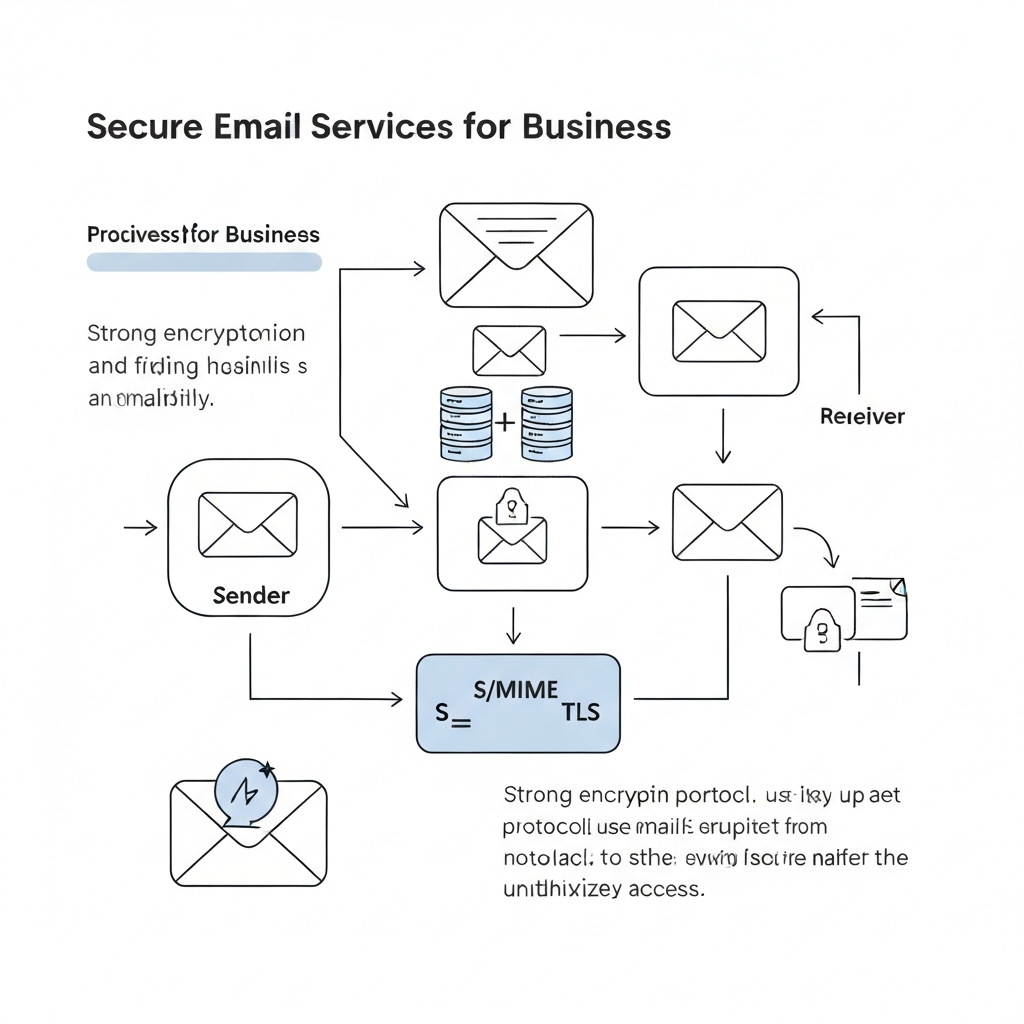Secure Email Services for Business: A Comprehensive Guide

In today's interconnected global economy, email remains the cornerstone of business communication. From client proposals and internal memos to sensitive financial data and strategic planning, virtually every aspect of your operation touches an inbox. However, this ubiquitous tool also represents one of the most significant security vulnerabilities for businesses of all sizes. A single compromised email can lead to devastating data breaches, hefty fines, and irreparable damage to your hard-earned reputation. This comprehensive guide will delve into the critical importance of secure email services for business, explore the threats you face, highlight essential features, and help you navigate the selection process to ensure your communications are protected.
For entrepreneurs, IT managers, and executives alike, understanding and implementing robust business email security is no longer an option; it's a fundamental necessity for survival and growth. Choosing the right secure email solution can transform your communication infrastructure from a potential liability into a powerful asset, fostering trust, enhancing productivity, and safeguarding your digital future.
The Critical Need for Secure Business Email
Imagine your company's most confidential client lists, proprietary product designs, or sensitive employee HR records being exposed to the public. The consequences are dire:
- Financial Losses: Beyond the immediate costs of incident response and recovery, businesses can face substantial fines for non-compliance with data protection regulations like GDPR or CCPA.
- Reputational Damage: A data breach erodes customer trust. Rebuilding that trust is a long, arduous, and often unsuccessful process.
- Operational Disruption: Attacks can cripple systems, leading to significant downtime and lost productivity.
- Loss of Competitive Advantage: Stolen intellectual property can end up in the hands of competitors.
The reality is that email is a primary attack vector. According to the Verizon Data Breach Investigations Report, a staggering 96% of malware is delivered via email. This statistic alone underscores why prioritizing secure email services for business is paramount.
Common Email Security Threats Businesses Face Today
Understanding the enemy is the first step in defending your digital fortress. Businesses today face a sophisticated and ever-evolving array of email-based threats:
Phishing and Spear Phishing
Phishing attacks are designed to trick recipients into revealing sensitive information (like login credentials or financial details) or downloading malicious attachments. Spear phishing is a more targeted form, where attackers research their victims to craft highly personalized and convincing messages, significantly increasing their success rate. These attacks often impersonate trusted sources, such as colleagues, clients, or well-known companies.
Malware and Ransomware
Malicious software, including viruses, worms, and trojans, can be embedded in email attachments or links. Once executed, they can steal data, disrupt operations, or encrypt your files, demanding a ransom for their release (ransomware). Ransomware attacks, in particular, can bring an entire business to a standstill.
Business Email Compromise (BEC)
BEC scams involve attackers impersonating executives or trusted business partners to trick employees into transferring funds or divulging sensitive information. These attacks are often highly sophisticated, relying on social engineering rather than technical exploits, and can result in millions of dollars in losses for targeted companies.
Man-in-the-Middle (MitM) Attacks
While less common directly via email content, compromised email systems or insecure network connections can facilitate MitM attacks. An attacker intercepts communication between two parties, potentially reading or altering the messages without either party's knowledge.
Data Leakage
Accidental or intentional sending of sensitive information to the wrong recipient, or through an insecure channel, constitutes data leakage. This can happen due to human error or a lack of proper data loss prevention (DLP) measures within the email system.
Insider Threats
These can be malicious (an employee intentionally leaking data) or accidental (an employee making a mistake). Secure email services with robust access controls and monitoring can help mitigate both.
Key Features of a Secure Business Email Service Explained
When evaluating secure email services for business, look for providers that offer a comprehensive suite of security features designed to protect your data at rest and in transit. Here are the essential components:
End-to-End Encryption (E2EE)
This is the gold standard for secure email. E2EE ensures that only the sender and the intended recipient can read the message. The email is encrypted on the sender's device and decrypted only on the recipient's device, with the service provider unable to access the content. This is crucial for highly sensitive communications.
Transport Layer Security (TLS)
TLS (and its predecessor SSL) encrypts the connection between your email client and the email server, and between email servers as messages are sent between providers. This protects your emails from being intercepted while in transit over the internet. While not as robust as E2EE, it's a vital layer of defense.
Two-Factor Authentication (2FA) / Multi-Factor Authentication (MFA)
2FA/MFA adds an extra layer of security beyond a password. It requires users to provide two or more verification factors to gain access to an account – for example, a password plus a code from a mobile app or a physical security key. This significantly reduces the risk of unauthorized access, even if credentials are stolen.
Robust Spam and Malware Filtering
Advanced filtering systems use sophisticated algorithms, AI, and machine learning to detect and block spam, phishing attempts, and malicious attachments before they reach user inboxes. Effective filtering is the first line of defense.
Data Privacy Policies and Compliance
A reputable provider will have clear, strong data privacy policies that align with global regulations such as GDPR, CCPA, and others relevant to your industry. They should be transparent about how your data is handled, stored, and protected. Compliance certifications like HIPAA (for healthcare) or SOC 2 (for service providers) are also critical indicators of trustworthiness.
Secure Storage and Access Controls
Your emails and attachments need to be stored securely. This includes encryption at rest, secure data centers, and granular access controls that allow administrators to manage user permissions and monitor access effectively. Features like data loss prevention (DLP) can prevent sensitive information from leaving the organization.
Regular Security Audits and Updates
The threat landscape is constantly changing. Secure email providers must regularly update their systems, patch vulnerabilities, and undergo independent security audits to ensure their defenses remain effective.
Top Secure Email Service Providers for Businesses (Overview)
Choosing the right provider can seem daunting, but several reputable services cater specifically to business needs, offering enhanced security and privacy features. While a full comparison is beyond the scope of this article, here are some notable options and what they offer:
- Proton Mail for Business: Known for its strong commitment to privacy and security, Proton Mail offers end-to-end encryption, zero-access encryption for stored emails, and a user-friendly interface. It's a strong contender for businesses prioritizing privacy and security above all else.
- Mailfence: This service provides robust security features including E2EE, digital signatures, and two-factor authentication. It's a good option for businesses looking for a balance of advanced security and collaboration tools.
- Tuta (formerly Tutanota): Tuta offers encrypted email and calendar services with a focus on privacy and simplicity. Its E2EE is applied across the entire service, making it highly secure.
- Mimecast: For larger enterprises, Mimecast offers a comprehensive suite of email security, archiving, and continuity services. It's designed for high-scale environments requiring advanced threat protection, DLP, and policy-driven encryption. (See Beyond Encryption's guide for more on enterprise solutions).
- Cisco Email Security: A robust solution often deployed in larger organizations, offering advanced threat protection, data loss prevention, and encryption tailored for enterprise environments.
It's also worth noting that mainstream services like Microsoft 365 and Google Workspace offer security features. However, achieving enterprise-grade security often requires careful configuration, the use of add-on security services, and a thorough understanding of their advanced settings. For businesses needing the highest levels of privacy and dedicated security infrastructure, specialized providers might be more suitable. Providers like Mailbox.org also offer secure email with encrypted cloud storage for business users looking for alternatives to major tech giants, as highlighted by Kinsta.
For a deeper dive into comparisons, resources like CyberInsider's and MailHippo's reports offer detailed analyses of various encrypted email services.
How Secure Email Enhances Business Productivity and Trust
While the primary motivation for adopting secure email services for business is protection, the benefits extend significantly into productivity and trust:
Reduced Downtime and Incident Response
Effective email security drastically reduces the number of successful phishing attacks, malware infections, and ransomware incidents. This means less time spent by IT staff on incident response, system recovery, and dealing with the fallout of security breaches. This saved time and resources can be redirected to more strategic initiatives.
Enhanced Collaboration and Communication
When employees trust that their communications are secure, they are more likely to share information freely and collaborate effectively. Secure email tools can also integrate with other productivity suites, streamlining workflows and making collaboration smoother. For instance, understanding your email traffic patterns through essential email inbox analytics can help optimize communication strategies.
Building Customer and Partner Confidence
In an era where data privacy is a major concern for consumers and business partners, demonstrating a commitment to secure communications builds trust. It signals that your business is responsible, reliable, and takes the protection of shared information seriously. This can be a significant competitive differentiator.
Meeting Regulatory Requirements
Many industries have strict regulations regarding data handling and communication security (e.g., HIPAA in healthcare, FINRA in finance). Implementing secure email services is often a non-negotiable requirement for compliance, helping businesses avoid costly penalties and legal issues. Ensuring your emails are delivered securely is part of this compliance.
Protecting Brand Reputation
A public data breach can severely tarnish a company's reputation. Proactive investment in secure email services is an investment in brand integrity and long-term sustainability. It's far more cost-effective to prevent a breach than to recover from one.
Evaluating and Choosing the Right Secure Email Solution for Your Business
Selecting the best secure email services for business requires a strategic approach tailored to your unique needs. Here's a step-by-step guide:
1. Assess Your Business Needs and Risk Profile
- Size of your organization: Solutions vary in scalability and administrative complexity.
- Industry and compliance requirements: Do you handle protected health information (PHI), financial data, or other regulated data? Look for specific compliance certifications (HIPAA, GDPR, etc.).
- Data sensitivity: How critical is the data you send and receive via email?
- Current infrastructure: How will the new service integrate with your existing IT ecosystem?
- Budget: Secure email services come at various price points.
2. Understand Key Security Features (Revisit Section 3)
Prioritize the features most critical to your risk profile. For highly sensitive data, E2EE is non-negotiable. For broad protection against common threats, robust filtering and MFA are essential. Consider the importance of implementing best practices for business email management alongside your chosen service.
3. Evaluate Usability and Adoption
Even the most secure system is ineffective if your employees find it too difficult to use. Look for intuitive interfaces, clear documentation, and comprehensive training resources. A solution that requires complex workarounds will likely lead to shadow IT or a decline in user adoption. Consider how easy it is to create a new email address within the system for new hires.
4. Check Provider Reputation and Support
Research the provider's track record, security certifications, and customer reviews. What level of technical support do they offer, and during what hours? Reliable support is crucial for resolving any issues quickly.
5. Consider Scalability and Future Growth
Choose a solution that can grow with your business. Can it accommodate more users, increased storage, and evolving security needs without requiring a complete overhaul?
6. Look for Integration Capabilities
Does the secure email service integrate with your CRM, collaboration tools, or other business applications? Seamless integration can significantly boost productivity and streamline workflows.
The Role of AI in Modern Email Security and Productivity
Artificial Intelligence (AI) is revolutionizing email security and management, offering proactive defenses and intelligent automation that were previously unimaginable. Modern secure email services are increasingly leveraging AI to enhance their capabilities.
AI-Powered Threat Detection and Prevention
AI algorithms can analyze vast amounts of data to identify subtle patterns indicative of sophisticated threats like advanced phishing campaigns, zero-day malware, and BEC attacks. They can learn from new threats in real-time, constantly improving their detection accuracy and staying ahead of evolving attack methods.
Intelligent Spam and Malware Filtering
Beyond traditional signature-based detection, AI-powered filters can understand the context and intent of emails, significantly reducing false positives and catching more sophisticated spam and phishing attempts that might bypass simpler filters.
Automated Workflow and Task Management
AI is also transforming email productivity. Tools like AI for Outlook and similar intelligent assistants can help manage your inbox more efficiently. Modern solutions are increasingly leveraging AI to enhance these capabilities. For instance, tools like an ai executive assistant can help streamline your workflow by managing incoming messages, prioritizing urgent communications, and even drafting responses, freeing up valuable human capital for more strategic tasks. Streamlining email workflow with AI can lead to significant time savings across your organization.
By integrating AI, businesses can achieve a more secure, efficient, and productive email environment, transforming a potential vulnerability into a strategic advantage.
Conclusion: Future-Proofing Your Business Communications
In the digital age, secure email services for business are not merely a technical requirement; they are a strategic imperative. The threats are real, evolving, and potentially devastating. However, by understanding the risks, identifying the essential security features, and carefully selecting a provider that aligns with your business's unique needs, you can build a robust defense.
Investing in secure email solutions protects your sensitive data, safeguards your reputation, ensures compliance, and ultimately, enhances your business's overall productivity and trustworthiness. Don't wait for a breach to highlight the vulnerability of your current system. Take proactive steps today to secure your communications and future-proof your business.



